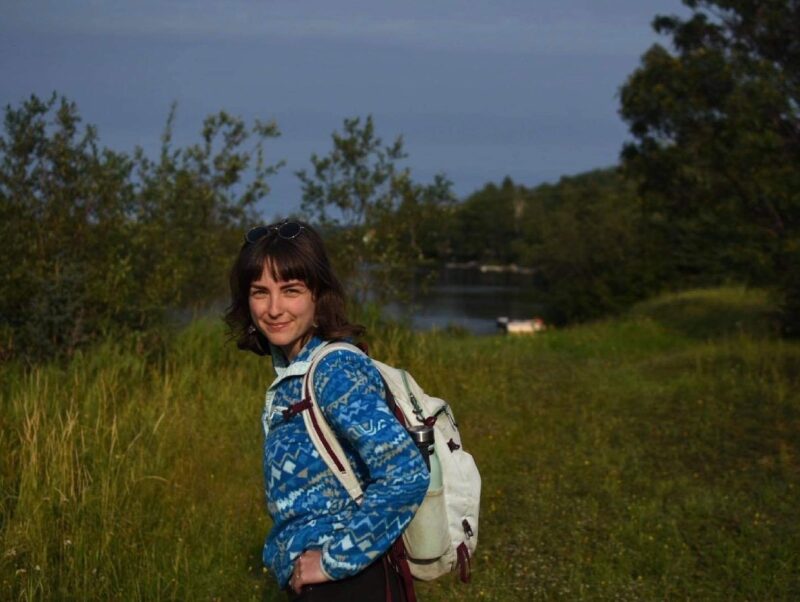“I’m not afraid of the fire.”
Patsy Gessey
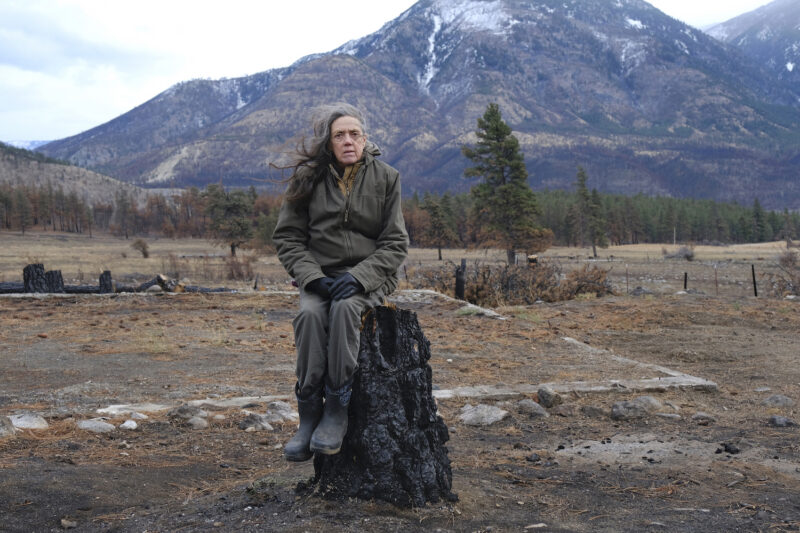
Patsy is a market gardener in Lytton, British Columbia, sharing fresh produce and flowers to locals and wildfire survivors like herself. She loves being her own boss, growing beautiful things, providing healthy food, and supporting her community. “People are happy with the produce and the flowers and it makes everyone feel joyous.” It’s her dream job — and a job she had to fight a fire to keep.
Patsy grew up in the 70s during a time of experimentation and possibilities. Originally from Alberta, she made her way to Banff after high school. She travelled around and found her way to B.C., where she became a tree planter. “I came out to B.C. when I was young following the wonder of it all,” says Patsy. She met her husband while tree planting and they worked together for a few years before moving to Vancouver for work and university. They eventually settled in Lytton in 1998 and started their market garden. A few years later they expanded with a field across the Fraser River. For years, they have sold fresh produce and flowers at the community Farmers Market.
In 2021, a wildfire swept through the village of Lytton and Patsy and her husband watched from across the Fraser River as the flames destroyed their home and their neighbours’ homes. They evacuated and eventually resettled in a friend’s tiny cabin across the Fraser River on the same side as their garden field.
The next summer, another wildfire threatened their new home. Patsy was working in her field when she noticed smoke billowing from the area of her tiny house. Her first instinct was to rush over to see how she could help her neighbours and found herself outrunning the flames and fighting to save her market garden.
I pulled up in my truck and everything was on fire. My neighbours had all the hoses that they could muster, all of the water. They told me just to go. They were utilizing all the water. So there was nothing I could do.
I knew that the fire was headed straight for my field because it was already all around the surrounding areas. So I was able to jump in my truck again and go to my field. I proceeded to move all the tools, my tractor and everything into the middle of the field and turn on all the sprinklers. I have quite a few overhead sprinklers that spray quite a distance. Meanwhile, I could hear things blowing up in the farm beside my field. We were running around trying to just get everything out of the way.
We saw the fire come through the end of the field and watched it come towards us. I finally said to Owen, my husband, “We got to go! We’ve just got to go!”
We hopped in our truck. We left with the sprinklers still on. We didn’t know what was going to happen. It was burning all around, all up and down either side of the road.
We kept running into more neighbours who didn’t know what the fire was doing. All they knew is they had to evacuate, so we kept saying, “It’s coming. It’s coming up the road.” We kept stopping because we thought, well, maybe it’ll stop. I don’t know why you always think it’s going to stop.
Finally, we got up to a hill and we saw that it was all burning. There were parts of the reserve burning, houses burning, and we just said, “We’ve got to go.” So we went down that same back road to Lillooet. By this time it was like 11 o’clock at night. They put us up at the Friendship Center.
In the morning, we had been told the tiny cabin had been saved. We needed to get a generator and come back because we had a freezer and the power was out. As we approached, we realized the devastation. It was way bigger than I thought. It was still on fire, and so we went racing down the road. There were power lines all over the place. I was driving as fast as I could in case anything was going to fall on me.
We finally got into the cabin, put the generator on, and we breathed a sigh of relief. But then the fire continued to rage up into the Stein Valley, and that was a horror show. It was zigzagging all over the place. You didn’t know where it was going to go. Everything’s burning all around us. So I raced away and went back to the field.
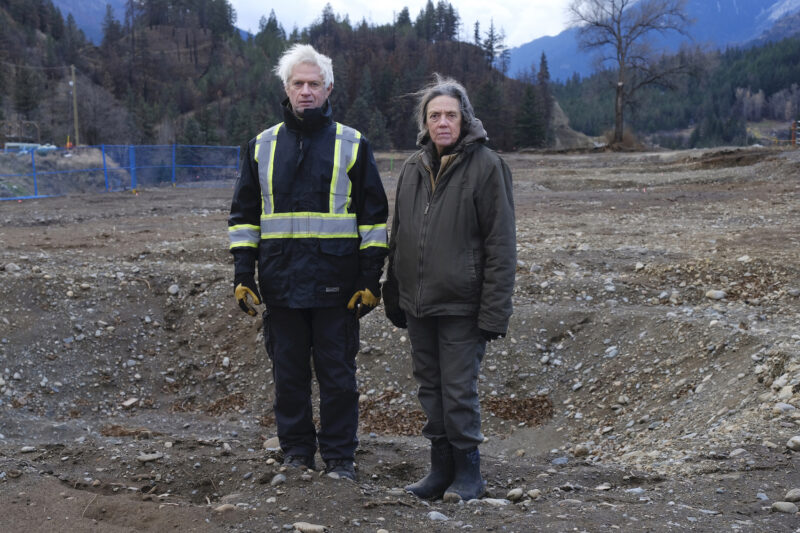
Owen and Patsy stand in front of their property, which burnt down in 2021, in Lytton, B.C. (CDP Photo/Jen Osbourne)
One of the neighbours who saved this cabin and these houses, was right at the entrance to our field. He said to us, “Oh, it’s still burning. Your field is starting up again.” So we ran in there and fought a little fire around the back of our greenhouse. We saw that fire was still smouldering everywhere, trees were smouldering. All around the outside, I had a bunch of fittings for irrigation, plastic containers, boxes to carry stuff, tools, hoses, market display items and sundry things that you need for a market garden. It was all gone.
People were just driving around, trying to put out these spot fires because they were everywhere. That went on for days. We just wandered around and tried to take stock of what we lost, what we could do, who we could help, who needed what, and where is it still burning? There was just so much loss for people.
We were mystified by how that fire actually started. Reflecting glass started a grass fire that turned into that big epic fire. That’s as quick as it can start. But then any wind blowing just keeps it going, and this place is tinder dry. It’s just a dry, dry place. We know that there’s a risk of fire, but it just starts so easily now.
It’s like everything was just drier than normal. If you want to see climate change in action, then there it is because our field is a 360 panorama. We could just stand up and watch as the mountains burnt
It makes us want to do some good work in rebuilding in a more sustainable way. You’ve got to get community food systems together. You got to make sure you’ve got access to water. We’ve got to protect our homes through proper fire safe methods.
I had a real sense of empowerment, being able to save the field because those sprinklers had been on almost for 24 hours before the water system got destroyed by the fire. You could see where the fire had stopped, where the ground was wet. I didn’t realize how much having water on something was going to stop that raging fire. Because it wasn’t stopping in the 2021 fire.
I didn’t have the same feelings of anxiety and helplessness as I did last year. Now, I’m in a position where I can help in a moment’s notice because I’m not traumatized. I learned a lot from that fire on what to do and what not to do. The 2021 fire was more like watching a movie that you had no control over. But this one I was an actual participant inside of it. I learned a lot: made me feel really empowered and really capable.
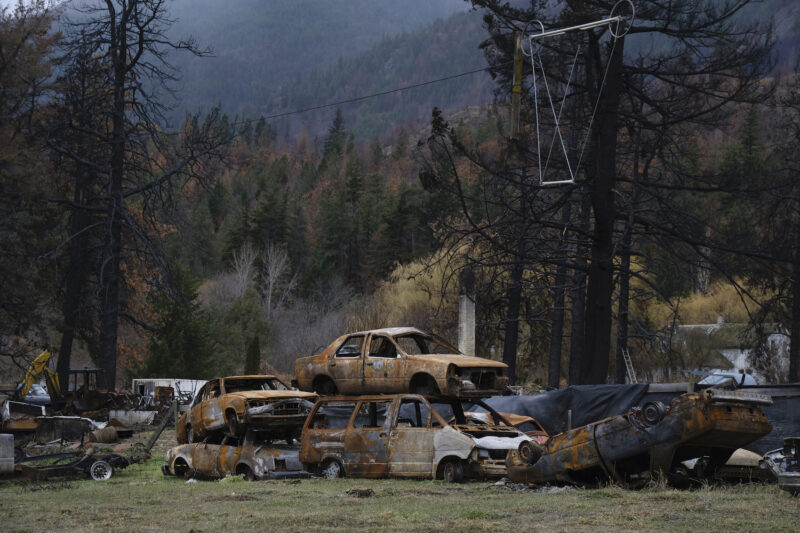
This property belongs to the people who lease Patsy and Owen their garden space. It burned in the 2022 fires. (CDP Photo/Jen Osbourne)
We have a lot of work to do in our town. And we are in a place where we can start from scratch. So in a way it’s really quite exciting. I think we’ve got to start getting together and form co-ops rather than always trying to do it individually. I supplied everybody with fresh veggies for the whole summer, as much as I could. And that was really something that was necessary. People needed that food. We were getting a lot of donations, but mostly canned goods and hard goods, not fresh stuff. So I was able to help that way.
In 2021, I would load up veggies in the truck and just go hang out in front of the gas station. There were a lot of people who came just to visit. It was just some sense of normalcy to have us hang out and visit outside in the gas station there. So, that was a good thing.
This year we restarted the farmers market. So now some of the other folks who used to come to the market are back.
I feel humbled by [the fires], but I don’t feel that they’re insurmountable. I think we can make a life for ourselves here where we won’t have to succumb to fire all the time and still have our beautiful place where we live right down by the river. We just have to think of a lot of innovative new technologies and they’re always coming. So there’s lots of optimism. I’m not afraid of fire.
This was originally published in The Tyee, on June 14, 2023.
Related Stories
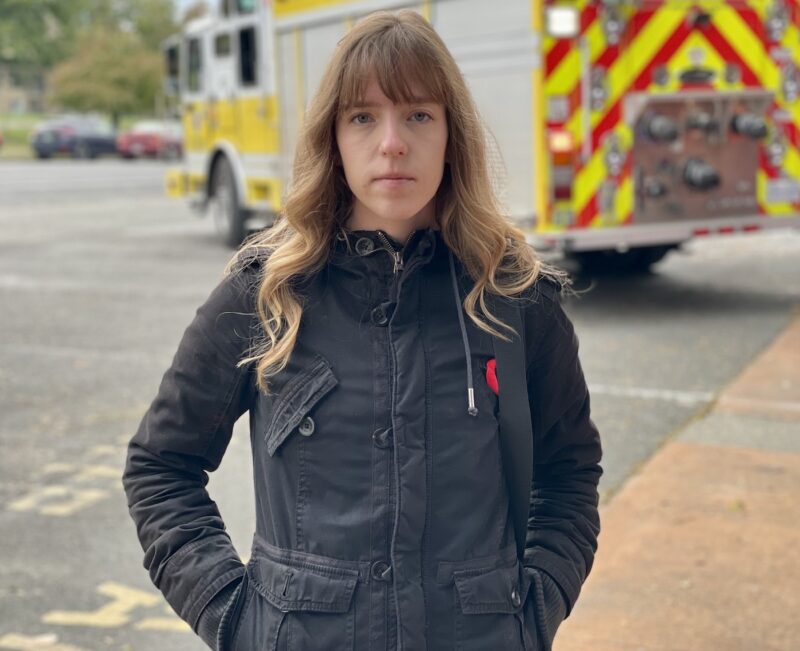
Kaitlyn Nightingale, Summerland, Canada
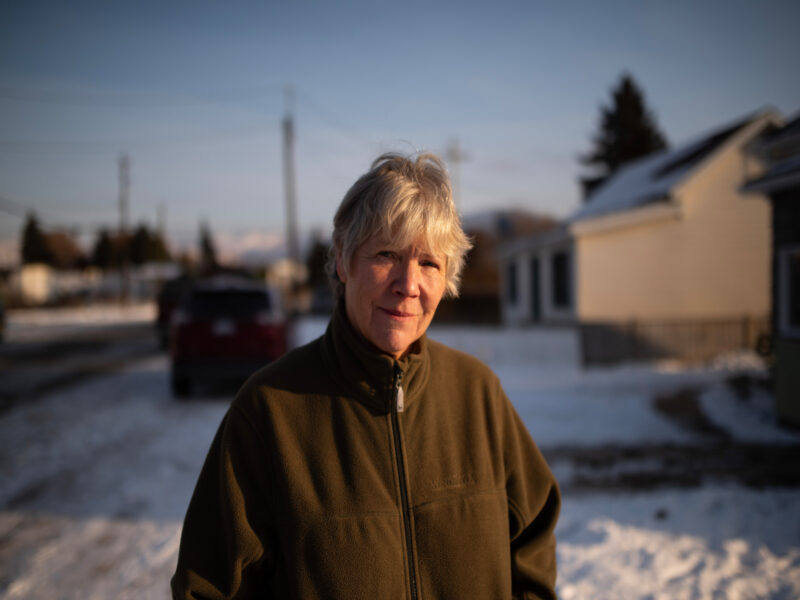
Donna Rae, Merritt, Canada
